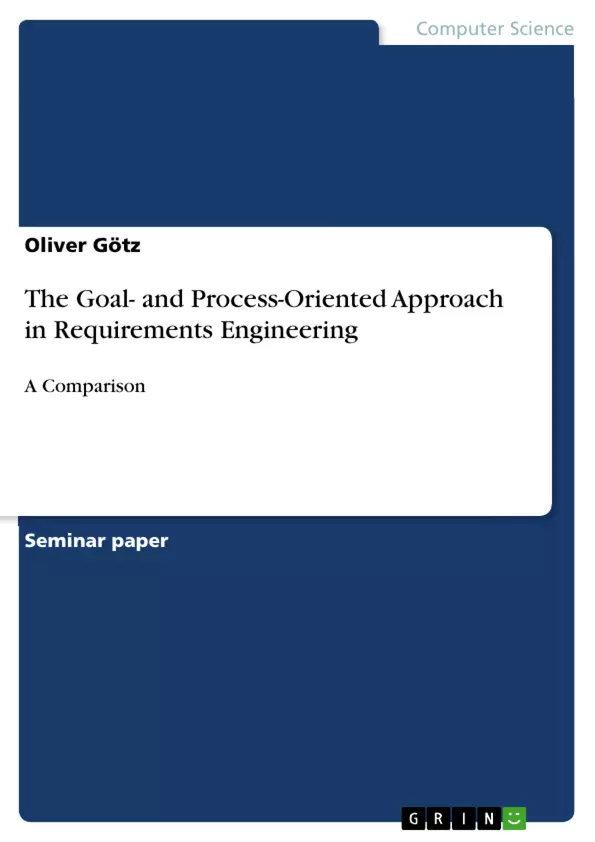The goal of this work was to provide a holistic overview of current frameworks for requirements elicitation. They can be catogrized as goal- or process-oriented ones. For achieving this goal, I conducted a structured literature review and summarized the results within in tables. Hence, this work can serve as reference manual for quickly getting an overview of possbile requirements elicitation approaches.
There exist a couple of approaches for the elicitation of requirements for software projects. Usually, it is difficult to identify the most relevant ones in order to have a coherent software development process. In general, it is distinguished between functional and non-functional requirements. Functional ones describe what a system has to do, what a system has to perform. Non-functional ones put constraints on the software, meaning they are quality attributes such as availability and security.
Inhaltsverzeichnis (Table of Contents)
- Introduction
- Theoretical Background and related Work
- Evolution of Requirements Engineering
- The process- and goal-oriented approach
- Research Method
- Research Approach Overview
- Preliminary Results: Keyword Search
- Analytical research framework
- Results
- Overview of RE Approaches
- Discussion
- Comparison of RE Approaches
- Kind of analysis/Context
- Notation
- Rationale
- Advantages/Disadvantages of PORE and GORE
- Comparison of RE Approaches
- Conclusions
- Contributions
- Limitations
- Future directions
- References
Zielsetzung und Themenschwerpunkte (Objectives and Key Themes)
This research paper focuses on comparing process- and goal-oriented approaches in requirements engineering (RE), highlighting their strengths and weaknesses. The study aims to provide practitioners with a framework for choosing the most suitable approach for their specific project.
- The evolution of requirements engineering from traditional to more advanced methods.
- The benefits and limitations of process- and goal-oriented approaches.
- The application of these approaches in enterprise resource planning (ERP) implementation.
- The challenges of managing stakeholder conflicts and inconsistencies in requirements specification.
- The importance of standardized frameworks for addressing these challenges.
Zusammenfassung der Kapitel (Chapter Summaries)
- Introduction: This chapter introduces the research topic of comparing process- and goal-oriented approaches in requirements engineering. It highlights the importance of RE in software development and discusses the challenges associated with specifying requirements accurately and efficiently. The chapter also defines key terms such as requirements, goals, and stakeholder conflicts.
- Theoretical Background and related Work: This chapter provides a brief overview of the evolution of requirements engineering, starting with traditional methods and transitioning to process- and goal-oriented approaches. It discusses the limitations of traditional methods in handling complex information technology systems and the need for more sophisticated approaches.
- Research Method: This chapter outlines the research methodology employed in this study. It includes a description of the research approach, keyword search results, and the development of an analytical research framework.
- Results: This chapter presents an overview of various RE approaches, summarizing their key features and applications.
- Discussion: This chapter focuses on comparing the different RE approaches, analyzing their similarities and differences based on factors such as context, notation, rationale, and advantages/disadvantages. The chapter specifically examines the process- and goal-oriented approaches (PORE and GORE), evaluating their strengths and weaknesses.
Schlüsselwörter (Keywords)
This research paper focuses on requirements engineering, specifically exploring process- and goal-oriented approaches. Key terms include: requirements engineering, software engineering, stakeholders, functional requirements, non-functional requirements, process-oriented approach, goal-oriented approach, KAOS, TROPOS, i*, NFR, enterprise resource planning (ERP), stakeholder conflicts, inconsistencies, standardized frameworks.
Frequently Asked Questions
What is the difference between functional and non-functional requirements?
Functional requirements describe what a system must do, while non-functional requirements specify quality attributes like security, availability, and performance constraints.
What are Goal-Oriented Requirements Engineering (GORE) frameworks?
GORE frameworks, such as KAOS, i*, and TROPOS, focus on the "why" behind requirements, helping to align software goals with organizational objectives.
What is the focus of Process-Oriented Requirements Engineering (PORE)?
PORE focuses on the workflows and activities involved in eliciting requirements, often used in complex projects like Enterprise Resource Planning (ERP) implementations.
How does this work help practitioners choose an RE approach?
The paper provides a structured literature review and summary tables comparing context, notation, and rationale for different RE approaches.
Why are standardized frameworks important in RE?
Standardized frameworks help manage stakeholder conflicts, resolve inconsistencies, and ensure a coherent software development process.
- Quote paper
- Oliver Götz (Author), 2016, The Goal- and Process-Oriented Approach in Requirements Engineering, Munich, GRIN Verlag, https://www.grin.com/document/355109



